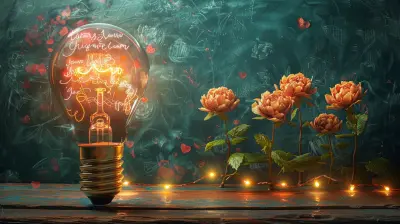The Role of Mentorship in Developing Creative Young Minds
15 June 2025
You know that one person who believed in you before you even believed in yourself? The one who nudged you in the right direction when you were stuck or unsure of what to do next? That’s mentorship in action. For young minds, especially those with the potential to innovate and create, mentorship can be a game-changer. It’s like having a personal guide through the wilderness of creativity, helping you avoid pitfalls and find your way to success.
In this article, we’re diving deep into the role of mentorship in developing creative young minds. Why is it so important, and how does it really work? Whether you’re a student, parent, teacher, or potential mentor, you’ll want to stick around because we’re about to uncover how mentorship can unlock the doors to creativity and foster the next generation of innovators.

Why Mentorship Matters for Creativity
First off, let’s talk about creativity. Creativity isn’t just about painting pictures or writing stories (although, yes, it can be). Creativity is about problem-solving, thinking outside the box, and seeing things in ways others might not. It’s about innovation in every field, from science and technology to the arts and humanities.But here’s the kicker: creativity doesn’t always come naturally. It’s a skill, and like any other skill, it needs to be nurtured. That’s where mentorship comes in. A good mentor can help young people discover their creative potential, hone it, and give them the tools they need to express it.
Mentorship matters because it provides:
- Guidance: Young minds often have raw talent but don’t always know how to channel it.
- Perspective: Mentors have been there, done that. They can offer real-world advice based on experience.
- Support: Creativity can be vulnerable. Having someone in your corner boosts confidence.
- Accountability: A mentor can push you to stay on track and not give up when things get tough.
In short, mentorship is more than just a helping hand—it’s a pathway to growing and sustaining creativity.

The Mentor-Mentee Relationship: A Two-Way Street
Here’s something people often misunderstand: mentorship isn’t a one-sided affair. While the mentee gets guidance, the mentor also gains from the relationship. It’s a two-way street where both parties grow.For the mentee, the benefits are obvious: learning from someone who’s been through similar experiences, developing new skills, and getting constructive feedback. But mentors, too, stand to learn. They gain fresh perspectives, new ideas, and often a renewed sense of purpose. In fact, many mentors say the experience helps them stay creative and engaged in their own work.
Think of it like a dance. Both the mentor and mentee need to be in sync, listening and responding to each other. It’s this dynamic relationship that fosters creativity and personal growth.
The Role of Trust
At the heart of any mentor-mentee relationship is trust. Without trust, mentorship falls flat. The mentee needs to feel comfortable enough to take risks, share ideas (even the crazy ones), and ask questions. The mentor, in turn, needs to create a safe space for that to happen.When trust exists, there’s room for failure. And let’s be real—creativity thrives on experimentation, which means failure is part of the process. A mentor helps the mentee understand that failures aren’t the end of the road; they’re just stepping stones to success.

How Mentorship Boosts Confidence and Courage
One of the biggest hurdles young creative minds face is self-doubt. “Am I good enough?” “What if people don’t like my ideas?” “What if I fail?” These questions can be paralyzing, and they often stop young creators before they even get started.Enter the mentor. A mentor isn’t just someone who gives you tips on how to improve your work. They’re someone who believes in you when you’re not sure you can believe in yourself.
Imagine this: You’re trying to climb a mountain, and every step feels uncertain. A mentor is like the experienced climber who’s already made it to the top. They can point out the best paths, warn you of obstacles, and, most importantly, tell you that you have what it takes to reach the summit.
This confidence boost is crucial. It’s not just about giving the mentee new skills; it’s about giving them the courage to use those skills.

Mentorship and the Importance of Constructive Feedback
Here’s the thing about creativity: it’s personal. When you create something, whether it’s a painting, a piece of music, or a solution to a problem, you’re putting a little piece of yourself out there. That’s why feedback can be tough—but it’s also essential.A good mentor knows how to give constructive feedback. They won’t just tell you what you did wrong; they’ll show you how to improve. They’ll point out your strengths as well as your weaknesses, helping you build on what’s good while fixing what needs work.
Let’s face it: not all feedback is created equal. We’ve all had that one person who just says, “It’s fine,” or worse, “It’s terrible,” without any explanation. That’s not helpful. What a mentor does is offer actionable insights. They’ll tell you why something works or doesn’t, and they’ll offer suggestions on how to make it better.
This kind of feedback is gold for young creatives. It helps them fine-tune their work while still encouraging them to take risks and try new things.
Mentorship in Different Creative Fields
It’s easy to think of mentorship in terms of traditional roles, like a teacher and a student. But mentorship exists in all sorts of creative fields, and it looks a little different in each one.In the Arts
In the arts, mentorship often takes the form of apprenticeships or studio critiques. Artists, whether they’re painters, musicians, or writers, thrive in environments where they can receive feedback from more experienced creators. A mentor might help a young artist refine their technique, but they’ll also challenge them to think about their work in new ways.In Technology
In tech, mentorship is often about problem-solving and innovation. Young developers or engineers might have the technical skills, but they often need guidance on how to apply those skills in real-world situations. A tech mentor provides that insight, helping the mentee turn their ideas into practical solutions.In Entrepreneurship
For young entrepreneurs, mentorship is crucial. Starting a business or launching a new idea can be overwhelming, and without guidance, it can feel like you’re in over your head. A mentor in this field will help the mentee navigate the challenges of business while encouraging them to stay creative and innovative.
The Long-Term Impact of Mentorship
The effects of mentorship don’t just stop when the relationship ends. The lessons learned, skills acquired, and confidence gained continue to influence the mentee long after they’ve moved on. In fact, many mentees go on to become mentors themselves, passing on what they’ve learned to the next generation of creative minds.Think of it like planting a tree. The mentor helps the mentee grow, but over time, that tree will bear fruit—fruit that can nourish others. This cycle of learning, growing, and giving back is one of the most powerful aspects of mentorship.
How to Find or Become a Mentor
If you're a young creative looking for a mentor, or if you’re someone who feels ready to mentor the next generation, there are several ways to get started.Finding a Mentor
- Networking: Attend events in your field of interest, whether they’re in-person or online. You never know who you might meet.- Ask for Help: Don’t be afraid to reach out to someone you admire. People are often more willing to mentor than you might think.
- Look for Formal Programs: Many schools, companies, and organizations offer formal mentorship programs.
Becoming a Mentor
- Offer Your Time: If you’ve got experience in a creative field, consider offering your time to a younger person who’s just starting out.- Be Open: Mentorship isn’t about having all the answers. It’s about being open to new ideas and willing to learn just as much from your mentee as they’ll learn from you.
- Listen First, Guide Second: Remember, mentorship is about the mentee’s growth. Be a guide, not a dictator.
Wrapping Up: The Power of Mentorship in Creativity
At the end of the day, mentorship is about more than just passing on knowledge. It’s about building a relationship that helps young creative minds flourish. Whether it’s through offering guidance, giving constructive feedback, or simply being there to cheer them on, mentors play a crucial role in helping young people find their creative path.And the best part? Mentorship isn’t just beneficial for the mentee—it’s a rewarding experience for the mentor, too. It’s a partnership that fosters growth, innovation, and, most importantly, creativity.
So, whether you’re looking for a mentor or considering becoming one, remember: the role of mentorship in developing creative young minds is nothing short of transformative.
all images in this post were generated using AI tools
Category:
Creativity In EducationAuthor:

Eva Barker
Discussion
rate this article
2 comments
Rhiannon McKinney
Mentorship is the secret ingredient in nurturing creativity. It transforms raw potential into innovative brilliance by providing guidance, inspiration, and a safe space for exploration. Just as a sculptor chisels away at stone, a mentor shapes the minds of young creators, unlocking their unique visions and empowering them to soar.
November 13, 2025 at 3:55 AM

Eva Barker
Thank you for highlighting the vital role of mentorship in fostering creativity. Your analogy of the sculptor beautifully captures how guidance and support can unlock unique potential in young creators.
Rex Simon
Mentorship nurtures creativity by providing guidance, support, and diverse perspectives. It empowers young minds to explore their potential, fostering an environment where innovative ideas can flourish. Investing in mentorship today shapes the innovators of tomorrow.
June 20, 2025 at 10:29 AM

Eva Barker
Thank you for highlighting the vital role mentorship plays in cultivating creativity. Your insights on guidance and diverse perspectives truly capture how mentorship empowers the next generation of innovators.


